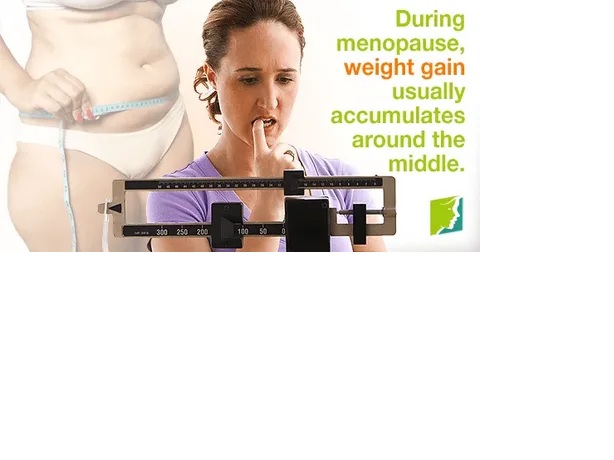Why Some Women Gain Weight Around Menopause

Menopause marks a significant transitional phase in a woman’s life, signaling the end of reproductive years and the onset of various physiological changes. Weight gain, particularly around the abdominal area, is a common concern for many women during this stage. In this comprehensive guide, we will delve into the factors contributing to weight gain around menopause, the role of hormonal changes, lifestyle factors, and strategies for managing weight effectively during this phase of life.
Understanding Menopause and Its Impact on Weight
Menopause Defined
Menopause refers to the natural cessation of menstruation, typically occurring in women around the age of 45 to 55. During menopause, ovarian function declines, leading to decreased production of estrogen and progesterone, two key hormones involved in regulating the menstrual cycle and various physiological processes.
Perimenopause
Perimenopause is the transitional period leading up to menopause, during which hormone levels fluctuate, menstrual irregularities may occur, and symptoms such as hot flashes, mood changes, and sleep disturbances may manifest. Perimenopause can last for several years before menopause is officially reached.
Hormonal Changes
The decline in estrogen levels associated with menopause can have several implications for body composition and metabolism. Estrogen plays a role in regulating appetite, metabolism, and fat distribution in the body. As estrogen levels decrease, women may experience changes in energy expenditure, insulin sensitivity, and fat storage, contributing to weight gain, particularly around the abdomen.
Factors Contributing to Weight Gain Around Menopause
Metabolic Changes
Hormonal fluctuations during menopause can alter metabolic processes, leading to a decrease in basal metabolic rate (BMR) and a tendency to gain weight more easily, especially if dietary and activity levels remain unchanged. Decreased estrogen levels may also affect the way the body utilizes carbohydrates and fats for energy, potentially leading to increased fat storage.
Muscle Loss
A decline in estrogen levels can contribute to the loss of muscle mass, known as sarcopenia. Muscle tissue is metabolically active and plays a crucial role in energy expenditure. As muscle mass decreases, BMR decreases, making it easier to gain weight, particularly fat mass, even with the same level of physical activity.
Lifestyle Factors
Various lifestyle factors, such as diet, physical activity, stress, and sleep patterns, can influence weight gain around menopause. Changes in appetite, food cravings, and eating behaviors may occur during perimenopause and menopause, potentially leading to overeating or unhealthy dietary choices. Additionally, decreased physical activity levels, sedentary behaviors, and changes in exercise patterns can contribute to weight gain and loss of muscle mass.
Psychosocial Factors
Psychosocial factors, including stress, mood changes, body image concerns, and emotional eating, can also play a role in weight gain around menopause. Hormonal fluctuations and life transitions associated with menopause may exacerbate stress levels and impact emotional well-being, leading to changes in eating behaviors and coping mechanisms.
Strategies for Managing Weight Around Menopause
Balanced Diet
Focus on consuming a balanced diet rich in nutrient-dense foods, including fruits, vegetables, whole grains, lean proteins, and healthy fats. Prioritize fiber-rich foods to promote satiety and regulate blood sugar levels. Limit processed foods, added sugars, and refined carbohydrates, which can contribute to weight gain and metabolic disturbances.
Regular Exercise
Incorporate regular physical activity into your routine to support weight management, preserve muscle mass, and improve overall health. Aim for a combination of cardiovascular exercise, strength training, flexibility exercises, and functional movements. Consult with a healthcare professional or fitness expert to develop a personalized exercise plan that meets your needs and preferences.
Stress Management
Practice stress-reducing techniques such as mindfulness, meditation, deep breathing exercises, yoga, or tai chi to mitigate the impact of stress on weight and overall well-being. Prioritize self-care activities and relaxation practices to promote emotional balance and resilience during the menopausal transition.
Adequate Sleep
Prioritize adequate sleep and establish healthy sleep habits to support hormonal balance, metabolism, and weight management. Aim for seven to nine hours of quality sleep per night and create a conducive sleep environment free from distractions and disruptions.
Seek Support
Seek support from healthcare professionals, registered dietitians, fitness trainers, or support groups specializing in women’s health and menopause. Collaborate with a multidisciplinary team to address your unique needs, set realistic goals, and develop sustainable strategies for managing weight effectively during menopause.
Conclusion
In conclusion, weight gain around menopause is a multifactorial phenomenon influenced by hormonal changes, metabolic factors, lifestyle habits, and psychosocial factors. While menopause may present challenges for weight management, adopting a holistic approach that addresses dietary patterns, physical activity levels, stress management, sleep hygiene, and social support can empower women to navigate this life stage with resilience and vitality. By making informed choices and implementing sustainable lifestyle modifications, women can effectively manage their weight and optimize their health and well-being during menopause and beyond. Remember that individual experiences may vary, and it’s essential to prioritize self-care and seek professional guidance as needed to support your journey through menopause.
Barbara is a freelance writer and a sex and relationships adviser at Dimepiece LA and Peaches and Screams. Barbara is involved in various educational initiatives aimed at making sex advice more accessible to everyone and breaking stigmas around sex across various cultural communities. In her spare time, Barbara enjoys trawling through vintage markets in Brick Lane, exploring new places, painting and reading.
[email protected]
- Exploring the Top CBD Topical A Comprehensive Review By Empe-USA - April 10, 2024
- Benefits of Ginger Root Supplements - April 2, 2024
- Benefits of Garlic Supplements - April 2, 2024

